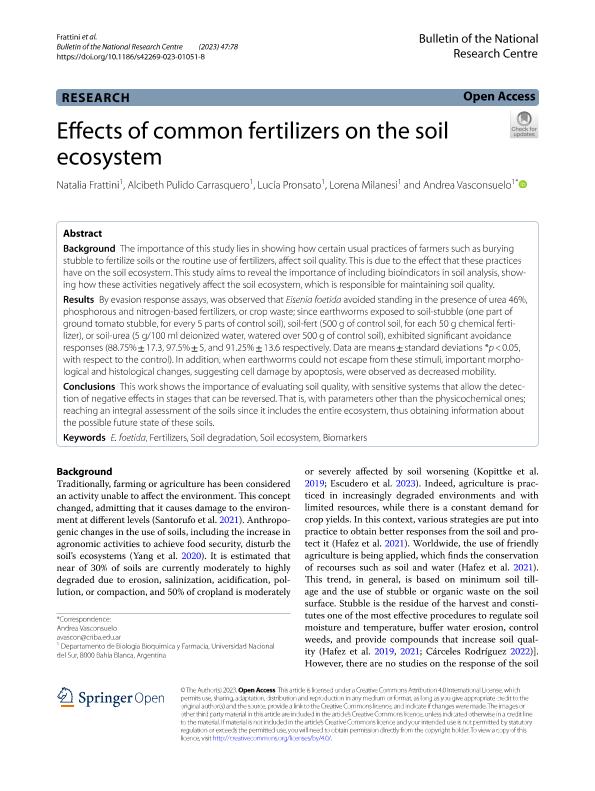Artículo
Effects of common fertilizers on the soil ecosystem
Frattini, Natalia María ; Pulido Carrasquero, Alcibeth Yoselin
; Pulido Carrasquero, Alcibeth Yoselin ; Pronsato, Lucía
; Pronsato, Lucía ; Milanesi, Lorena Magdalena
; Milanesi, Lorena Magdalena ; Vasconsuelo, Andrea Anahi
; Vasconsuelo, Andrea Anahi
 ; Pulido Carrasquero, Alcibeth Yoselin
; Pulido Carrasquero, Alcibeth Yoselin ; Pronsato, Lucía
; Pronsato, Lucía ; Milanesi, Lorena Magdalena
; Milanesi, Lorena Magdalena ; Vasconsuelo, Andrea Anahi
; Vasconsuelo, Andrea Anahi
Fecha de publicación:
01/06/2023
Editorial:
Springer
Revista:
Bulletin of the National Research Centre
ISSN:
1110-0591
e-ISSN:
2522-8307
Idioma:
Inglés
Tipo de recurso:
Artículo publicado
Clasificación temática:
Resumen
The importance of this study lies in showing how certain usual practices of farmers such as burying stubble to fertilize soils or the routine use of fertilizers, affect soil quality. This is due to the effect that these practices have on the soil ecosystem. This study aims to reveal the importance of including bioindicators in soil analysis, showing how these activities negatively affect the soil ecosystem, which is responsible for maintaining soil quality.Results: By evasion response assays, was observed that Eisenia foetida avoided standing in the presence of urea 46%, phosphorous and nitrogen-based fertilizers, or crop waste; since earthworms exposed to soil-stubble (one part of ground tomato stubble, for every 5 parts of control soil), soil-fert (500 g of control soil, for each 50 g chemical fertilizer), or soil-urea (5 g/100 ml deionized water, watered over 500 g of control soil), exhibited significant avoidance responses (88.75% ± 17.3, 97.5% ± 5, and 91.25% ± 13.6 respectively. Data are means ± standard deviations *p < 0.05, with respect to the control). In addition, when earthworms could not escape from these stimuli, important morphological and histological changes, suggesting cell damage by apoptosis, were observed as decreased mobility. Conclusions: This work shows the importance of evaluating soil quality, with sensitive systems that allow the detection of negative effects in stages that can be reversed. That is, with parameters other than the physicochemical ones; reaching an integral assessment of the soils since it includes the entire ecosystem, thus obtaining information about the possible future state of these soils.
Palabras clave:
E FOETIDA
,
FERTILIZERS
,
SOIL DEGRADATION
,
SOIL ECOSYSTEM
,
BIOMARKERS
Archivos asociados
Licencia
Identificadores
Colecciones
Articulos(INBIOSUR)
Articulos de INSTITUTO DE CIENCIAS BIOLOGICAS Y BIOMEDICAS DEL SUR
Articulos de INSTITUTO DE CIENCIAS BIOLOGICAS Y BIOMEDICAS DEL SUR
Citación
Frattini, Natalia María; Pulido Carrasquero, Alcibeth Yoselin; Pronsato, Lucía; Milanesi, Lorena Magdalena; Vasconsuelo, Andrea Anahi; Effects of common fertilizers on the soil ecosystem; Springer; Bulletin of the National Research Centre; 47; 1; 1-6-2023; 1 - 7
Compartir
Altmétricas



